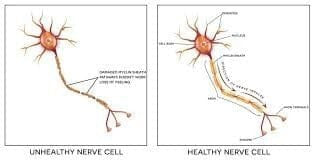Neuropathy, also known as peripheral neuropathy, is a common condition caused by damage to the peripheral nerves of the nervous system. The peripheral nerves spread out from the brain and spinal cord and relay nerve impulses and sensory information from the body to the spinal cord. Then, they are carried to the brain. Damage to these nerves interferes with the normal function of the peripheral nervous system. Our product, Cobrazol, has helped thousands of sufferers with its all-natural and organic make-up to reduce and minimize discomfort; some have complete relief after several applications.
Symptoms of Neuropathy
Neuropathy symptoms include abnormal sensations in the extremities, most commonly in the feet. Other neuropathy symptoms can also occur because there are many types of peripheral nerves with specialized functions.
For example, peripheral nerves control the autonomic nervous system, which is responsible for involuntary functions including:
• Blood pressure
• Breathing
• Contraction of the smooth muscles of organs, such as the Heart and Bladder
• Digestion
• Sexual functions
The most common cause of neuropathy is diabetes - called diabetic neuropathy. Neuropathy can also result from metabolic disorders, infections, malignancy, inflammation, vitamin deficiencies, toxins, inherited conditions, and other abnormal processes.
What are the symptoms of Neuropathy?
As nerves become damaged, neuropathy develops slowly over a while. Various symptoms can occur due to the many types of peripheral nerves with specialized functions that can be affected by neuropathy.
Common neuropathy symptoms often affect the sensory or motor functioning of the arms and legs. Symptoms include:
• Muscle twitching or cramps
• Muscle weakness and atrophy (wasting of muscle tissue)
• Poor coordination and balance, leading to falls
• Poor muscle control and body movement
• Problems with swallowing
• Sores or lesions that do not heal, leading to infections
• Unusual sensations, such as pain, numbness, pins and needles, tingling, burning, or prickling, that begin in the feet. In later stages of neuropathy, the hands can be affected as well. The abnormal sensations can sometimes extend to the arms, legs, and trunk.
Other Symptoms of Neuropathy
Neuropathy can also affect the transmission of involuntary or partially voluntary nerve impulses from the central nervous system (brain and spinal cord) to certain areas of the body, such as the bladder, intestines, or stomach. These autonomic nerves carry signals that regulate bodily functions, such as sweating, digestion, breathing, and blood pressure.
Symptoms of autonomic neuropathy include:
• Abdominal bloating
• Blurred vision due to abnormal pupil dilation and constriction
• Constipation or diarrhea
• Drop-in blood pressure and feeling light-headed
• Heat intolerance due to impaired sweating. Excessive sweating is also possible.
• Increased heart rate
• Nausea and vomiting due to slow emptying of the stomach
• Problems with urination, such as incontinence and hesitancy with urination
• Sexual dysfunction, such as impotence (erectile dysfunction) in men and vaginal dryness in women
Severe Symptoms That Might Indicate a Life-threatening Condition
Over time, neuropathy can lead to serious and possibly life-threatening complications, such as cardiac arrhythmia and gangrene.
Seek immediate medical care (call 911) if you, or someone you are with, have any of these symptoms:
• Change in alertness or consciousness, such as passing out, lethargy, or unresponsiveness
• Chest pain or palpitations
• Difficulty breathing or shortness of breath
• Difficulty or inability to swallow
• Hot, dry skin and a lack of sweat
• Severe dizziness that does not resolve
Neuropathy is caused by damage to the peripheral nervous system. The peripheral nerves relay messages from the brain and spinal cord to the rest of the body. Widespread nerve damage can result from metabolic disorders, infections, malignancy, inflammation, vitamin deficiencies, toxins, inherited conditions, and other abnormal processes.
A common cause of neuropathy is diabetes. Uncontrolled diabetes causes high blood sugar levels that permanently damage nerves over time. Neuropathy can also be caused by long-term pressure or compression of a nerve or nerves.
What are the Risk Factors for Neuropathy?
Several factors increase your risk of nerve damage and neuropathy. Risk factors include:
• Alcoholism
• Certain diseases, such as diabetes, cancer, lupus, Charcot-Marie-Tooth disease, rheumatoid arthritis, hepatitis, vasculitis, hypothyroidism, and HIV/AIDS
• Certain medications, including chemotherapy
• Exposure to certain toxins, such as insecticides, lead, mercury, glues, solvents, and arsenic
• Long-term pressure on a nerve due to such conditions as a tight cast, a lengthy surgical procedure, or carpal tunnel syndrome
• Nerve trauma
• Poor circulation
• Vitamin B and vitamin E deficiency
Reducing your risk of Neuropathy
You can lower your risk of neuropathy and permanent nerve damage by:
• Avoiding exposure to toxins, such as insecticides, lead, mercury, glues, solvents, and arsenic
• Not drinking alcohol or limiting alcohol intake to one drink per day for women and two drinks per day for men
• Seeking regular medical care throughout your life and following your treatment plan for diseases and disorders, such as diabetes, hypothyroidism, vasculitis, and other diseases and conditions that can cause neuropathy
• Taking frequent breaks and using proper techniques for repetitive activities that can cause pressure or compression of a nerve, such as keyboarding or using a jackhammer
• Using proper technique when using crutches and notifying your healthcare provider if a cast is too tight or if other orthopedic devices cause discomfort
How is Neuropathy Treated?
Treatment plans for neuropathy are individualized according to the underlying cause and the presence of coexisting diseases and complications. Treatment generally involves a multifaceted plan that addresses the underlying cause, minimizes pain and abnormal sensations, and reduces the risk of complications like gangrene. The ultimate goal is to help you achieve and maintain an independent and active life.
In addition to treating the underlying cause of neuropathy, treatment may include:
• Medications to relieve pain, inflammation, and other symptoms
• Physical therapy and occupational therapy to maintain and increase your strength and function
• Surgery to relieve pressure on a damaged nerve
• Walkers, canes, and other assistive devices, such as grab rails in the bathroom, to maintain balance.




